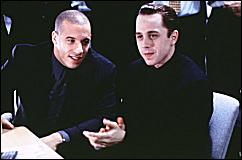![[Deep Focus]](../../flicker/logo.gif) |
|
|
BOILER ROOM | |
 |
GRADE: C+ | Here are the young men. |
|
The opening scenes of Boiler Room juice it up real quick, with our protagonist and narrator Seth (Giovanni Ribisi) swept up in a noisy celebration among young, besuited men who act like they've just become Masters of the Universe. As we eventually learn, Seth and the lads are essentially salesmen at a decidely third-tier brokerage that uses hard-sell telemarketing to push allegedly hot-prospect stocks on middle-American investors who don't know how to say "no" to an investment opportunity. For a while, it looks like writer/director Ben Younger might have a bone to pick with the get-rich-quick day-trading zeitgeist, but it turns out that he's up to something completely different, and less interesting. At the real heart of Boiler Room is an utterly conventional for-the-love-of-my-hard-assed-father melodrama that culminates, of course, in reconciliation. In order to get there, however, the film name-checks Glengarry Glen Ross and Wall Street and sets the film's overheated sales culture to a hip-hop soundtrack (Younger favors unconventional editing against the beats, which recalls the jazz-fueled jump cuts of Deconstructing Harry), a counterpoint to the swagger of the men of J.T. Marlin, themselves mostly in their early 20s. When we first meet Ribisi, in flashback, he's a street-smart college drop-out who favors instant gratification -- rather than waiting for his degree, he's making a killing by running a back-room gambling operation out of his Queens apartment for the local student population. His father (Ron Rifkin) is a federal judge who, naturally, disapproves of such irresponsible life choices, warning, ominously, that they could end his own career. As serendipity would have it, Ribisi is visited late one night by Greg (Nicky Katt) a well-tailored, high-rolling Wall Street type, who pitches him to come to work at J.T. Marlin, a brokerage with offices about an hour outside the city, just off the Long Island Expressway (can these headquarters be far from that dark suburban estate featured in Eyes Wide Shut?). Intrigued by the promise of serious money and a chance to go legit, Seth signs up. The scenes detailing the workings of the boiler room itself, the wide-open office where new trainees spend their days chatting up leads before handing them off to the senior agents, are fairly compelling stuff. As many times as we've seen movies where unscrupulous salespeople sweet-talk naive bumpkins out of their dollars, there's still something fascinating and appalling about watching Ribisi's demeanor change subtly as he learns how to spin a sales pitch -- and, eventually, how to tell the right lies -- in order to close the deal. Through all this, Ribisi is just great, visibly gaining confidence even as he starts to suspect that his new gig pays out to well to be legit. As one of the firm's hotshot agents, Katt is steely and impudent as the profesional adversary who figures Ribisi may be just a little too talented. A different kind hotshot is embodied by Chris (Vin Diesel), who knows too well that the firm is too good to be true, but respectfully declines when Seth asks him to think about that. With shady dealings the film's raison d'etre, you'd expect some confrontations, and maybe some double-dealing, between the main characters as the screws get tightened, but mostly you'd be wrong. For the real conflict, Younger falls back on indie-film cliche, weakening the moral lesson. Rather than blind greed, the real driving force in Seth's life is his father, who, natch, doesn't know how to love. And rather than building tension in professional terms, Younger ops to make Greg a jealous ex -- that receptionist who starts making goo-goo eyes at Seth as soon as he walks in the door, see, was previously going out with Greg. Nia Long is a beautiful and naturalistic actress, but her presence can't obscure the opportunitism of this love affair. (Interestingly, Nia just happens to be black -- thankfully, the film opts cleanly against making the multiracial thing an issue.) Even worse are several clumsy inserts establishing that the feds are investigating the company, and a hysterically maudlin subplot having to do with a husband and father (Taylor Nichols, who plays the chump well) whose life Seth destroys over the course of about a week. I have no information on the history of this screenplay, but it plays a little like a solid short film that became bloated and crippled when padded to feature-length. Despite its flaws, it is a wicked little debut from an interesting writer/director. In one nicely conceived pot shot against the money mentality, the guys from the boiler room are gathered for rest and recreation in front of a TV set running a video of, right, Wall Street. They're reciting the dialogue in unison, like a bunch of Star Wars fans watching Episode IV for the umpeenth time, and with a creepy singlemindedness. At one point, one of the guys actually seems to be masturbating, just below the frameline -- in a later shot, we see he's just playing with a beer bottle, but I'd dearly love to believe the initial impression was intentional. It's also interesting to see the guys out on the town, where they're treated like yesterday's refuse by brokers from "real" Wall Street firms who figure them, in a heartbeat, for the bottom-feeders they are. At any rate, the father/son drama remains blander-than-bland, and there's not quite enough meat elsewhere to warrant a recommendation.
| |
|
Written and directed by Ben Younger Cinematography by Enrique Chediak Edited by Chris Peppe Starring Giovanni Ribisi, Nicky Katt, and Vin Diesel USA, 2000 Theatrical aspect ratio: 1.85:1
| |

| |
 http://www.deep-focus.com/flicker/
bryant@deep-focus.com
http://www.deep-focus.com/flicker/
bryant@deep-focus.com